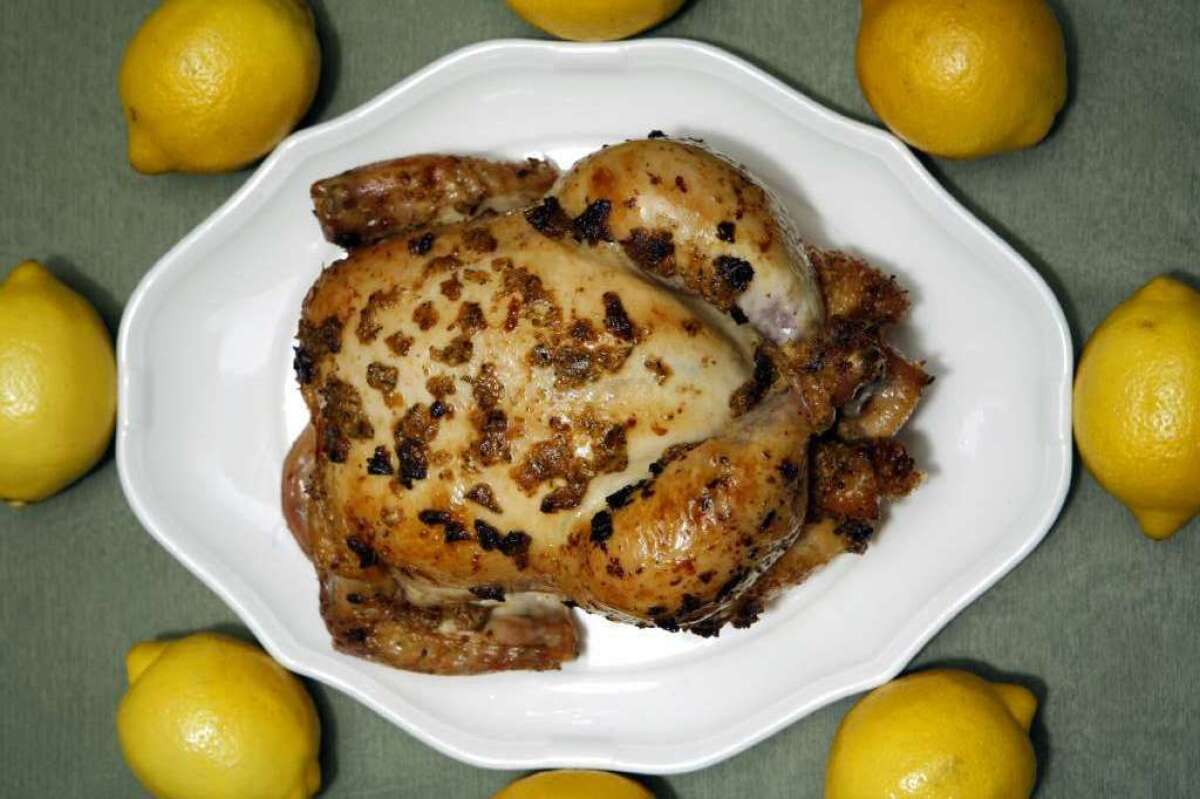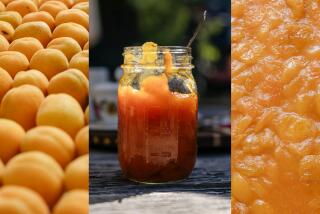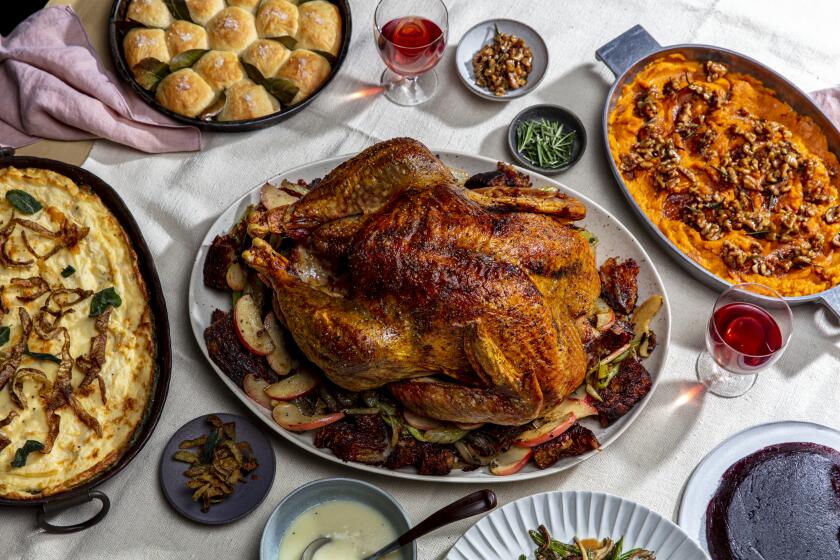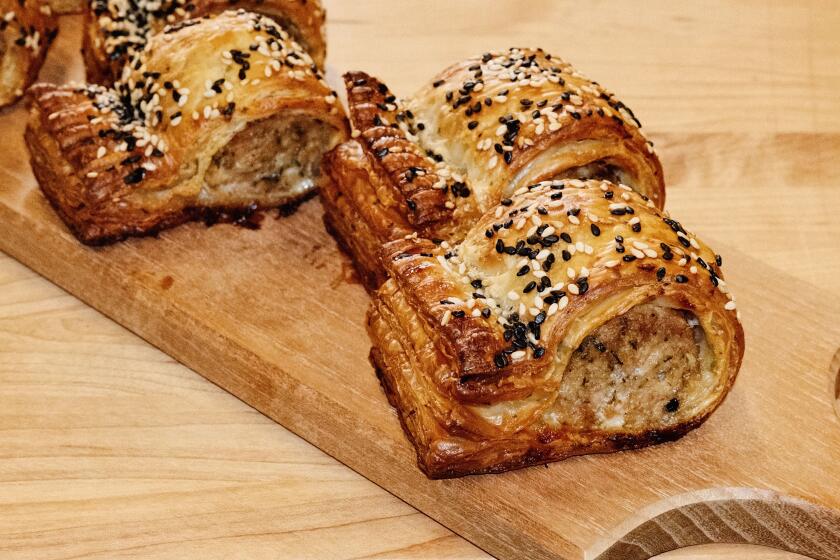Test Kitchen tips: Preserved lemons

Introducing preserved lemons in her classic Moroccan cookbook, âCouscous and other Good Food from Morocco,â Paula Wolfert wrote:
âPreserved lemons, sold loose in the souks, are one of the indispensable ingredients of Moroccan cooking, used in fragrant lamb and vegetable tagines, recipes for chicken with lemons and olives, and salads. Their unique pickled taste and special silken texture cannot be duplicated with fresh lemon or lime juice, despite what some food writers have said.â
Preserved lemons seem to be turning up in more restaurant dishes as chefs incorporate their unique flavors in a variety of recipes, and packaged preserved lemons are increasingly showing up in more specialty and gourmet markets. As increasingly available as they may be commercially, preserved lemons are just as easily made at home -- so long as you give them sufficient time (30 days) to ripen. And they make excellent homemade gifts for the cooks in your life. Continue reading below for Wolfertâs recipe for preserved lemons, along with the recipe for roast chicken with preserved lemons, pictured above.
Cooking is fun â at least it should be! No matter how long youâve been in the kitchen, there is always something new to learn, whether itâs a simple twist on an old technique, or a handy tip to save time and energy. In this series of short videos, I demonstrate a variety of kitchen tips, ranging from how to hold a chefâs knife for maximum control to using a spoon to peel fresh ginger. If you have any gadgets, kitchen tips or questions youâd like me to explore, leave a comment or shoot me an email at [email protected].
PRESERVED LEMONS
Working time: 10 minutes
Ripening time: 30 days
From âCouscous and other Good Food from Moroccoâ by Paula Wolfert.
Ingredients:
5 lemons
1/4 cup salt, more if desired
Optional Safi mixture:
1 cinnamon stick
3 cloves
5 to 6 coriander seeds
3 to 4 black peppercorns
1 bay leaf
Freshly squeezed lemon juice, if necessary
1. If you wish to soften the peel, soak the lemons in lukewarm water for 3 days, changing the water daily.
2. Quarter the lemons from the top to within 1/2 inch of the bottom, sprinkle salt on the exposed flesh, then reshape the fruit.
3. Place 1 tablespoon of salt on the bottom of a sterile 1-pint mason jar. Pack in the lemons and push them down, adding more salt, and the optional spices, between layers. Press the lemons down to release their juices and to make room for the remaining lemons. (If the juice released from the squashed fruit does not cover them, add freshly squeezed lemon juice -- not chemically produced lemon juice and not water.) Leave some air space before sealing the jar.
4. Let the lemons ripen in a warm place, shaking the jar each day to distribute the salt and juice. Let ripen for 30 days.
To use, rinse the lemons, as needed, under running water, removing and discarding the pulp, if desired -- and there is no need to refrigerate after opening. Preserved lemons will keep up to a year, and the pickling juice can be used two or three times over the course of a year.
ROAST CHICKEN WITH PRESERVED LEMONS
Total time: 1 hour and 40 minutes, plus marinating time for the chicken | Serves 4
Note: Adapted from âCasa Moroâ by Sam and Sam Clark. Preserved lemons are generally available at Middle Eastern markets as well as Whole Foods. Serve the chicken with steamed couscous or fried potatoes. Other sides could include a simple pilaf or bulgur wheat and some salad.
2 medium or 3 small preserved lemons
2 garlic cloves
Salt
1/2 lemon, juiced (keep the squeezed lemon half to put inside the chicken)
3 tablespoons roughly chopped cilantro
1 teaspoon cumin seeds, roughly ground
1 teaspoon sweet paprika
3 tablespoons olive oil, divided
1 (3 1/2 - to 4-pound) organic or free-range chicken
Freshly ground black pepper
Scant 1/2 cup water
1. Rinse the preserved lemons well under cold water. Remove the inside pulp and discard.
2. Using a mortar and pestle, or in a small bowl with a sturdy spoon, grind the garlic cloves to a paste with one-fourth teaspoon salt. Place the garlic paste, preserved lemons, lemon juice, cilantro, cumin, paprika and 2 tablespoons olive oil in a food processor or large mortar and puree until smooth.
3. Smear the marinade all over the chicken and season lightly with pepper. (You will not need salt as the preserved lemons are already very salty.) Stuff the squeezed lemon half into the body cavity. Transfer the chicken to a dish and leave it to marinate in the refrigerator for about 6 hours, or overnight if you prefer.
4. When you are ready to roast the chicken, heat the oven to 350 degrees.
5. Oil a roasting pan with the remaining tablespoon oil. Place the chicken in the pan and roast until done, about 1 hour and 15 minutes, basting every 15 minutes or so with the juices in the pan. After about 1 hour, pierce the leg with a skewer or sharp knife; the chicken is ready if the juices run clear and will need a little more time if the juices are still pink. Or place a thermometer into the thigh, avoiding the bone; the chicken is done when the temperature reaches 165 degrees. Transfer the chicken to a board to relax for 10 minutes, loosely covered with foil.
6. To make some gravy, pour off most of the oil from the pan and place the pan on the stove over medium heat. Add the water and bring to a gentle simmer. Drain any juices from the chicken into the pan, and scrape the pan for any caramelized bits to season the gravy. Taste the gravy, and add a little water if desired to thin.
Each serving: 487 calories; 45 grams protein; 2 grams carbohydrates; 0 fiber; 32 grams fat; 8 grams saturated fat; 178 mg. cholesterol; 318 mg. sodium.
Love cooking as much as I do? Follow me @noellecarter
More to Read
Eat your way across L.A.
Get our weekly Tasting Notes newsletter for reviews, news and more.
You may occasionally receive promotional content from the Los Angeles Times.











